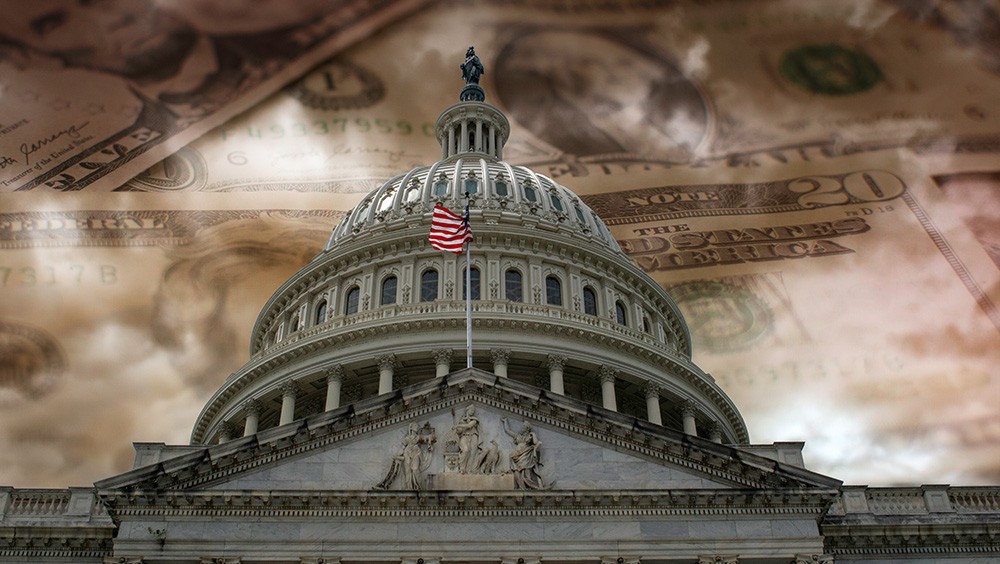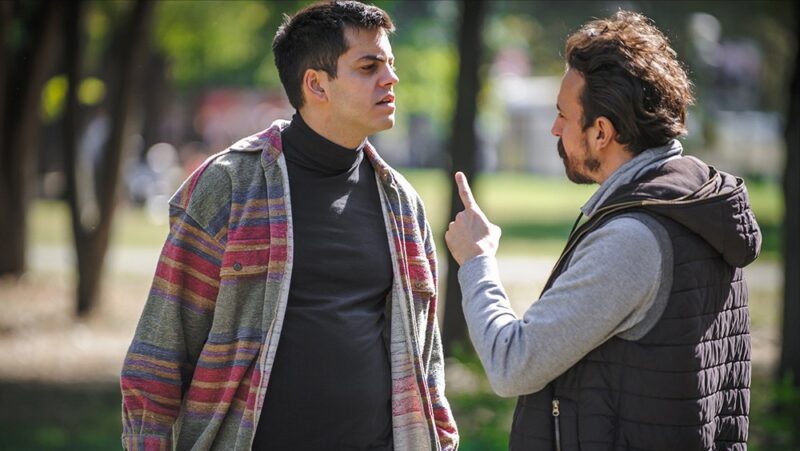When Money Is Speech: Political Campaign Spending Explained

As each Election Day nears, many consumers of media on TV and online might feel like the number of political campaign ads gets higher and higher — along with the number of solicitations for campaign donations.
Media consumers and voters may also wonder about the role of money in elections and regulations around it.
This article will highlight how the courts have weighed laws and policies to regulate campaign contributions and spending, especially related to campaign spending and the First Amendment right to free speech.
Is the money spent on political campaigns considered speech?
Yes, both giving money to political campaigns and spending money by campaigns are recognized as “speech” by the U.S. Supreme Court.
Over the past roughly 50 years, Congress and the Supreme Court have gone back and forth to define and refine limits and protections for campaign spending under the First Amendment.
To keep the government and the political process working as designed, the government has an interest in minimizing the perception or reality of corruption, such as fraud, extortion and promising illegal benefits in exchange for money or votes.
Since the 1970s, some people and policy makers have also suggested that it would help the political process if money were less of a factor in political campaigns, or if candidates for office had equal amounts of money to spend on campaigning.
RELATED: What speech is (and isn't) protected by the First Amendment?
A series of campaign finance reform laws have enacted limits on campaign contributions and spending and created the Federal Election Commission to enforce these regulations.
A series of court rulings, including at the Supreme Court, have struck down many of these provisions as unconstitutional limits on free speech. Over time, the court has become increasingly protective of money spent on campaigns as free speech.
Brief timeline of campaign finance laws and cases
- 1907: Contributions to candidates for federal office from corporations and banks are banned.
- 1972-1976: Laws limit individual contributions to candidates and parties, limit candidate spending and create the Federal Election Commission.
- 1976: The Supreme Court strikes down campaign spending limits but upholds contribution limits (Buckley v. Valeo).
- 1990: The Supreme Court upholds a Michigan law restricting corporate campaign spending (Austin v. Michigan Chamber of Commerce).
- 2002: The Bipartisan Campaign Reform Act (BCRA), sometimes called McCain-Feingold after its Senate sponsors, sets additional limits on campaign contributions and election spending by corporations — primarily those going directly to the national political parties that are often referred to as “soft money.”
- 2003: Much of the BCRA is upheld by the Supreme Court (McConnell v. Federal Election Commission).
- 2007: The Supreme Court strikes down part of the BRCA restricting independent groups’ advocacy ads (Federal Election Commission v. Wisconsin Right to Life Inc.).
- 2008: The Supreme Court strikes down part of the BRCA regulating self-financed campaigns (Davis v. Federal Election Commission).
- 2010: The Supreme Court in Citizens United v. Federal Election Commission strikes down the portion of the BRCA that restricted corporations from airing ads mentioning candidates. The case was related to a conservative group’s corporate-funded paid TV program criticizing candidate Hillary Clinton, which the court ruled should have been allowed to air.
- 2014: The Supreme Court strikes down federal limits on aggregate contributions by an individual to several candidates or committees, saying that aggregate limits don’t pose a substantial risk of corruption (McCutcheon v. Federal Election Commission).
Today, campaign finance laws OK’d by the courts do set some limits on campaign contributions or require disclosure about the contributions. Courts have said these requirements can sometimes be OK because it is an important goal to limit actual or perceived corruption in politics, and that some contribution regulations can help achieve this while protecting as much political speech as possible. Courts have been less likely to support limits on campaign spending.
Free speech and campaign contributions
Campaign contributions are when a person or organization gives money or something else of value such as a gift or a free service to a candidate’s campaign committee or to another political organization to put into their budget for the campaign.
Courts have said that laws that regulate campaign contributions are subject to less strict review under the First Amendment than laws that regulate campaign spending. According to the Congressional Research Service, courts say that regulations on campaign contributions may sometimes be OK because they are a marginal, indirect limit on speech, and there are many additional ways to express support for a candidate and to discuss political issues generally. However, courts say that limits on campaign contributions still cannot be too restrictive.
Restrictions on campaign contributions vary depending on who the donor is and on who the recipient is. Generally, larger contributions and contributions that go directly to a candidate are more likely to be limited because these types of contributions create an appearance of corruption in the political process, if not actually involving corruption itself. Congress wants to prevent corruption in politics.
Corporate campaign contributions to candidates
One of the earliest restrictions on campaign contributions, originating in 1907, is a ban on corporations donating to political candidates. Corporations, nonprofit organizations and unions cannot give to federal candidates’ campaigns. Banks and associations (to include organizations legally designated as labor organizations, trade associations, incorporated membership organizations, and incorporated cooperatives) also may not donate to state or local candidates.
Government contractors are even more restricted from making political donations because of pay-to-play laws that say that government benefits cannot be given in exchange for support of government officials’ campaigns. These restrictions apply over the period the government is looking for or working with a contractor firm.
State laws vary, with some banning corporate contributions to campaigns of candidates for state-level office and some allowing them within certain limits.
Courts have said these restrictions on campaign contributions are OK to prevent possible corruption or even the appearance of corruption. The state must show how a proposed contribution limit will achieve that goal without preventing contributors from expressing their views.
Individual campaign contributions to candidates
Individual people may contribute to candidates’ campaigns, subject to some limits. For example, there are maximum allowed donations per candidate per election, though courts have said that no law may limit the total amount of contributions to various candidates someone may make.
It is illegal to try to get around campaign limits by giving money to a friend to then give to a candidate’s campaign.
Foreign nationals, people who are not U.S. citizens or lawful permanent residents, may not donate to candidates for federal office.
At the state level, individual contribution limits also vary from no limits to limits based on the office the recipient is seeking.
Campaigns must report the name and additional information about individual donors who give more than a designated amount.
Courts have said these restrictions may be OK if the contribution limits are not too low to enable both donors and candidates to effectively participate in campaigning. Courts want donors to be able to give enough to make a useful contribution to a campaign and to enable donations to fund adequate communications to get campaign messages to voters.
Corporate and individual campaign contributions to political action committees
People, corporations, unions and other associations may all give to groups called political action committees or PACs. There are limits to the amount of money that can be contributed.
Regulations on contributions to such political groups are least restrictive when the groups are totally independent of candidates. These groups are called super PACS, and they do not coordinate with candidates’ campaigns in the communications they produce. Courts have said that this kind of independent expression of political views is highly protected by the First Amendment.
If, however, the PACs do coordinate their messaging with candidates or give money to candidates for their own communications, donations from all sources are more limited.
Both types of PACs must disclose donations over certain amounts to maximize oversight and ensure proper separation between candidates and PACs. However, the donations may come from nonprofits or associations whose own members and donors can be anonymous. Companies may also give to PACs that they create.
Just as foreign nationals are not allowed to donate to political candidates’ campaigns, they are not allowed to donate to PACs or super PACs either.
Free speech and campaign expenditures
Campaign expenditures are when candidates, people or groups spend money to share their views and ask for support, such as through sending mailers and airing TV ads.
Courts have said that campaign spending limits do have a substantial impact on the First Amendment freedoms of speech and association. Because limits on campaign spending directly impact how speech can be communicated, they are subject to more scrutiny and a higher bar than limits on campaign contributions.
Candidates’ campaign spending
Courts have also said that there is not a risk of corruption, like exchanging money for official acts, by candidates when they are spending money to produce communications, so there is less justification to limit this spending.
Money that the candidates’ own campaign committees spend on communicating their message is least restricted.
One limitation that has been permitted: Candidates cannot spend campaign contributions on personal expenses unrelated to their campaigns.
Restrictions that do not prevent speech are also generally upheld. For example, candidates may be required to state their name and support of the message in a political ad. Though this is a form of compelled speech, courts have said it doesn’t violate the First Amendment because it serves the important purpose of informing voters about the source of the advertisement and is only a limited burden on the candidate’s free speech rights that doesn’t prevent political speech.
Most other limits on campaigns’ communications — particularly those that prevent candidates from speaking or spending campaign money in support of their efforts — would be considered by courts to be impermissible limits on free speech.
Independent groups’ campaign spending
Similarly, money that people or groups such as corporations or PACs spend to share their political views or advocate for or against a candidate — provided the messages are not created at the direction of or coordinated with a candidate — cannot be limited.
These groups may, however, be subject to disclosure requirements about their spending and about contributors for the spending, with more disclosure required the closer it is to an election and the more is spent. Courts have said that these disclosures may be required to promote transparency and have upheld them because they generally do not excessively burden donors’ speech compared to an outright ban on spending.
Some nonprofit organizations, to retain tax exempt status, are barred from political advocacy, such as by spending money on ads to explicitly support or oppose a candidate.
The bottom line on free speech and campaign money
Federal and state campaign finance law is a complex area with different restrictions and requirements depending on the flow of funds.
Courts and lawmakers have debated the goals and lawfulness under the First Amendment of limiting campaign donations and spending.
In recent decades, the Supreme Court has increasingly ruled that while contributions to candidates’ campaigns may be subject to some limits to prevent possible corruption, spending to talk about candidates or issues, when it is not coordinated with those candidates, is free speech protected by the First Amendment.
This report is compiled based on previously published Freedom Forum content and with the input of Freedom Forum experts including First Amendment Specialist Kevin Goldberg. The editor is Karen Hansen. Email.
What Are Fighting Words? Definition, Examples and More
National Security and the First Amendment: When Can Rights Be Limited?
Related Content

